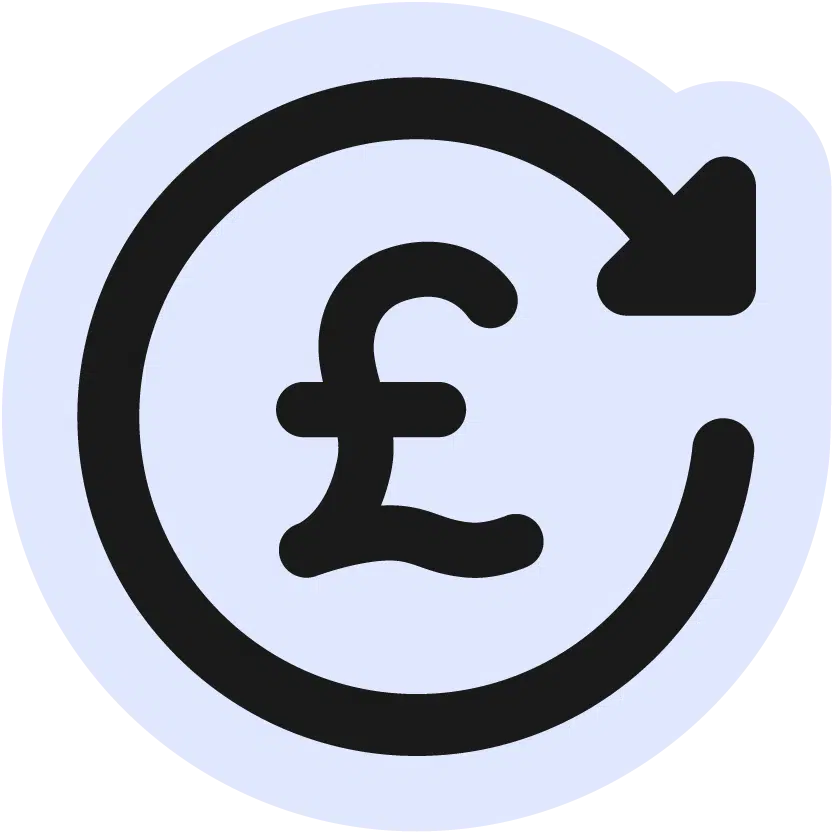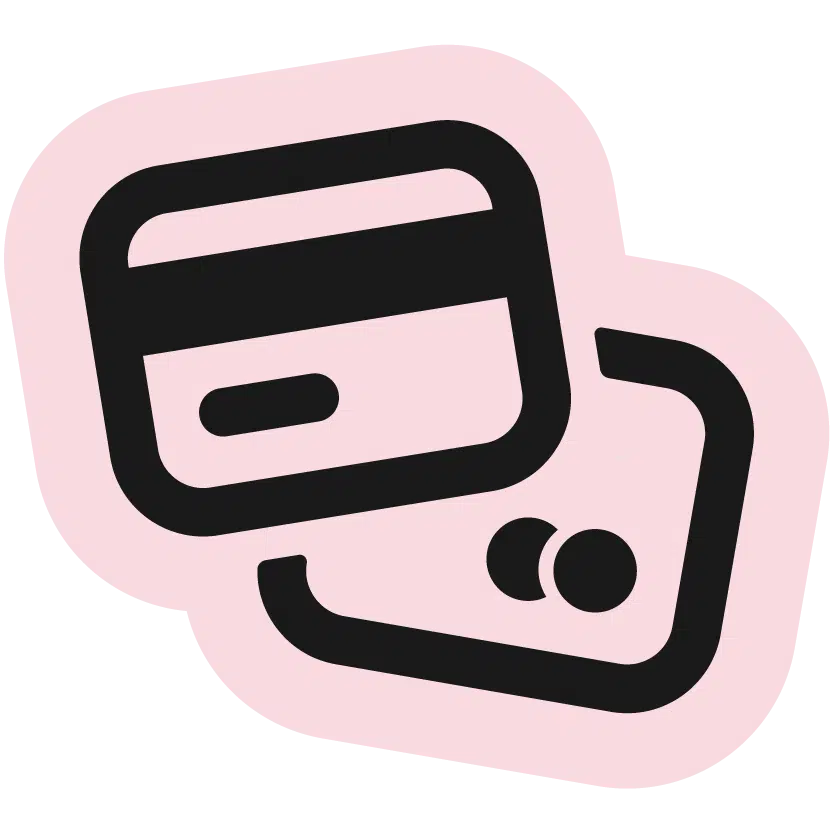Debt repayment is combined
By combining your debt payment into one single affordable amount, a DMP makes it easier to manage your debt.
We’ll explain all fees and risks clearly, so you can make an informed decision.
* Interest & charges are not guaranteed to be frozen, but we succeed in negotiating this over 95% of the time.


To discover more about how to manage your debt and to receive free debt advice, you can visit www.moneyhelper.org.uk.

To discover more about how to manage your debt and to receive free debt advice, you can visit www.moneyhelper.org.uk.
Before committing to a DMP, it’s important to consider all the advantages and disadvantages. Take your time to research and ask any questions you have about DMPs to one of our advisors.
By combining your debt payment into one single affordable amount, a DMP makes it easier to manage your debt.
It’s not guaranteed, but creditors often agree to freeze interest and charges. If they don’t, we’ll review your plan and discuss alternatives.
Your monthly DMP payment will be based on what you can afford, which is often lower than your current payments to creditors.
There is no public record of who’s on a DMP, so only you, your creditors and your DMP company will know about the arrangement.
Once your DMP has started, many creditors may reduce direct contact, but they can still reach out. If they do, send any demands to us and we’ll deal with them on your behalf.
Your DMP will continue until you cancel the arrangement or until your debts are paid off in full. If you cancel your DMP, any outstanding debt will still be owed.
A DMP is not legally binding, so creditors have the right to take legal action.
There’s no guarantee that creditors will accept the DMP. MoneyPlus will be able to negotiate on your behalf.
You may receive less contact from creditors once your DMP is in place, but they’re not legally required to stop sending you letters.
On a DMP you’ll no longer be making your contractual payments, so your credit rating is likely to be affected.
If you’re finding it hard to keep up with monthly payments, a Debt Management Plan (DMP) could help.
A DMP is an informal plan that helps you repay what you owe in a way you can afford. You make one monthly payment, based on what you can realistically pay.
We review your income and spending to work this out. We then contact the companies you owe money to and ask them to accept a lower monthly payment.
A DMP could help if you’re:
If you’d like advice on whether a Debt Management Plan is right for you, get in touch and we’ll talk through your options.


Buy now, pay later

Credit card

Overdraft

Payday loan

Store card

Bank loan

Buy now, pay later

Credit card

Overdraft

Payday loan

Store card

Bank loan
A DMP will only cover what’s known as “non-priority” or “unsecured” debt. This includes debts such as overdrafts, credit cards, payday loans and water bills if paid directly to the water company rather than your landlord.
A DMP won’t cover “priority” debt. Priority debt is a type of debt that can have serious consequences if you don’t pay it. This includes debts such as income tax, rent, national insurance or a TV licence.
It’s important to keep this information in mind when deciding if a DMP is right for you, as you will still need to keep paying your priority debts alongside your DMP payments.
A Debt Management Plan could help if you have more than one unsecured debt and can afford a small monthly payment.
There are some basic requirements, but you do not need to work this out on your own.
Our online tool and advisers will help you by looking at your situation and explaining your options, so you can decide what’s right for you.
You may be suitable for a Debt Management Plan if you:

If you want to apply for a DMP or learn more about what the process involves, get in touch and we will:

We look at your finances, including the debts you owe, to understand your situation and explain what options may be available.

If you choose a solution with MoneyPlus, we’ll send you a clear summary of what’s been recommended and what happens next. We’ll guide you through each step, so you know what to expect.

With your agreement, we’ll contact the companies you owe money to to set up affordable payments. We’ll also ask them to freeze interest and charges.
Finding the right debt solution matters. What works for one person may not work for another.
That’s why MoneyPlus looks at your situation as a whole. We take time to understand your income, your debts, and what you can afford before explaining which options may be available.
You can use our online tool or speak to an adviser. You can ask questions at any time, and we’ll make sure you understand your options before you decide.
Our aim is to help you manage your finances in a way that works for you, with clear debt advice and practical budgeting support.

Simplify your debts
One affordable monthly payment, no more juggling debts

Breathe easier
2 in 3 people feel less stressed since getting support*

Personalised advice
97% say our advice fits their situation*

Simplify your debts
One affordable monthly payment, no more juggling debts

Breathe easier
2 in 3 people feel less stressed since getting support*

Personalised advice
97% say our advice fits their situation*
*MoneyPlus customer survey 366 respondents May 2025
Melissa
was £22,000 in debt
Debt includes

Before entering a Debt Management Plan
£739 per month
As a MoneyPlus Advice customer
£133 per month

Payment reduction of £606!
Based on a genuine MoneyPlus customer. The name and image have been changed for privacy purposes.
“
– Linda, West Yorkshire
Originally owed over £14,000 to 8 different companies
Debt Management Plan (DMP) frequently asked questions.
Mortgage
Having a DMP in place can make it difficult to get a mortgage. The reason for this is that payments towards your debts will show on your credit file, and this may be used against you in a mortgage application.
Remortgage
Similarly, it can be difficult to remortgage your existing home on a DMP, though there are options depending on the length of your current plan. If your mortgage plan expires, your current lender will likely offer their standard variable rate. While not the best deal, it will allow you to continue making repayments.
Renting
Renting, on the other hand, should be more straightforward. If you keep your rent payments up-to-date and pay off any rental debts that you may have, then a DMP shouldn’t affect your current tenancy.
While a Debt Management Plan can’t guarantee that bailiffs will no longer come to your door, having an agreed repayment plan in place could help keep your assets safe.
As bailiffs are typically a last resort for lenders, setting up a Debt Management Plan is usually an indication that you plan to repay your debts, and should reduce the risk of legal force.
This depends on your monthly repayment amount, interest and charges (if applicable), and your personal circumstances. The actual amount of time your plan will last could change if your personal circumstances change.
For example, if your income increases, you could increase your payments and reduce the length of your plan. However, if something changes and you need to reduce your payments, this will extend the length of the plan.
DMPs are quite flexible, so you may find that you’re able to pay it off earlier by increasing your monthly payments or paying a lump sum.
If your personal circumstances change and you find yourself coming into money, our internal Settlements Team can help you to get an early settlement figure, which could see you settle your debt for less.
A Debt Management Plan will usually lower your credit score as you’ll be paying it back more slowly and in smaller instalments. Potential lenders will therefore see that your debts are being settled this way and may be more reluctant to give you a loan.
Any debts you have will stay on your credit file for six years after the date they’re paid off or defaulted. It is important to note, however, that your DMP won’t be recorded as a separate entry. Instead, creditors may add a marker to show you’re paying back through a DMP.
Taking out further credit while on a DMP would impact your monthly expenditure, and could make repayments unaffordable.
When using our DMP services, our expert advisors will help you to set up a realistic monthly budget, which will account for all regular, day-to-day costs that are likely to pop up. We’ll make sure you are left with enough money to cover all of your daily expenses, reducing the need to borrow money.
If you do need to take out a new credit agreement, the lender will run a credit check. Due to the impact on your credit file of making reduced payments, you may be charged a higher interest rate for the credit you take out, or refused credit altogether.
Taking out further credit while on a DMP would impact your monthly expenditure, and could make repayments unaffordable.
When using our DMP services, our expert advisors will help you to set up a realistic monthly budget, which will account for all regular, day-to-day costs that are likely to pop up. We’ll make sure you are left with enough money to cover all of your daily expenses, reducing the need to borrow money.
If you do need to take out a new credit agreement, the lender will run a credit check. Due to the impact on your credit file of making reduced payments, you may be charged a higher interest rate for the credit you take out, or refused credit altogether.
A debt plan review is a regular check to make sure your debt solution still fits your current situation. If you’re on a DMP or another managed debt solution, your provider will look at whether anything has changed in your finances over the past 12 months.
You’ll be asked to share up-to-date details of your income, living costs and any new debts. This helps your adviser check if your monthly payment is still affordable and fair for both you and your creditors. If your circumstances have changed, your payments might be adjusted.
This yearly review is an important part of keeping your plan on track. It makes sure you’re not paying more than you can manage and helps your creditors stay on board. Your adviser will guide you through the process and explain what’s needed, so you’re fully supported at every step.
Payment break limits can vary depending on your individual circumstances and your creditors’ policies. If you’re on a DMP, a payment break may be allowed if you’re experiencing short-term financial difficulty, such as a drop in income or an unexpected expense.
There’s no fixed number of times you can request a payment break, but each request is reviewed carefully to make sure it’s appropriate and necessary. Your adviser will look at your budget and situation before contacting creditors to ask for their agreement.

We understand that no two money worries are the same.
That’s why we tailor our support to your situation, helping you find the right way forward.
Not ready to chat? Start with our online advice.
